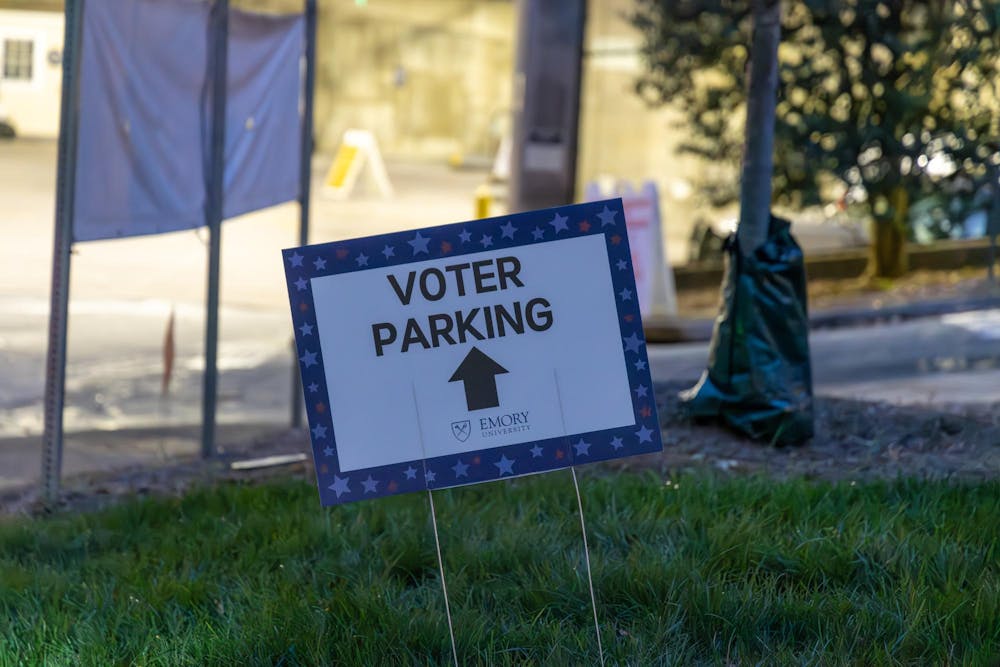Pennsylvania citizens waited for six hours to vote on Election Day. Over 2,000 miles away in Arizona, a line of 300 voters stretched nearly a quarter of a mile. However, when students, faculty and locals showed up to Emory University’s 1599 Clifton Road polling site to vote in the presidential election on Nov. 5, they did not have to wait to cast their ballots.
Claudia Vargas-Ramirez (25C) said this election could affect many issues important to her and other women. As a Puerto Rican, she said she felt the need to voice her opinion because many in her community are not able to.
Comedian Tony Hinchcliffe, who spoke at a campaign rally for U.S. President-Elect Donald Trump on Oct. 28 at Madison Square Garden, called Puerto Rico a “floating island of garbage in the middle of the ocean.” Since then, Democratic vice presidential candidate Tim Walz has condemned Hinchcliffe, calling the comedian a “jack-wad.”
This was the first presidential election in which many Emory students were able to vote. The race was deadlocked going into Election Day, with the final NBC News poll showing that U.S. Vice President Kamala Harris and Trump were tied with identical support at 49%.
Nicholas Wong (26C) and Avik Sinha (26C) said that their first time voting in a general election was “very smooth.” Wong said he was uninterested in politics, and Sinha mentioned that he was “apprehensive” about this election.
Alex Greenberg (28C) said it felt like his civic duty to vote in the presidential election. As a New Jersey native, he registered to vote in Georgia because he thought his vote had “more impact” here. Greenberg was not alone in this decision — many out-of-state students voted in Georgia, which was a swing state in the election. An Oct. 23 poll from The Emory Wheel showed that 75% of the 100 respondents registered in Georgia, whereas 23% registered to vote in another state.
Audrey Zhang (28C) originally hails from Maricopa County in Arizona but decided to vote in Georgia despite both being swing states. As a left-leaning voter, she said her impact in Georgia was more influential than in Arizona.
Zhang said added that she would be keeping up with Tuesday’s election coverage. When asked about her nerves going into the election, she said she had already done her part and that there was no looking back.
Despite many citing ease with casting their ballots, some voters had trouble due to issues with their voter registration. Michelle Lu (28C) said poll workers told her that her address was entered incorrectly. While she was still able to vote, she said the process was “slow.” Lu had registered through the Emory Votes Initiative (EVI).
Earlier this fall, EVI encountered a discrepancy with voting registration instructions after advising hundreds of students to use their Emory mailing address instead of their residential address when registering to vote. Georgia’s voter registration application has separate sections for residential and mailing addresses. After finding out about the issue, EVI began advising students to register using their dorm address. Young Democrats of Emory and Fair Fight U Emory encouraged students to submit new applications using their residential addresses.
Before Election Day, over half of registered Georgia voters cast their ballots early at polling sites or through absentee ballots. Election officials cited concerns about delayed results in the state due to hand-counting paper ballots after polls closed at 7 p.m. on Election Day. The Georgia State Election Board approved a new rule on Sept. 20 that required three poll workers to count ballots in piles of 50 until all three counts were the same. The Board approved the rule despite the advice of the state attorney general’s office, the secretary of state’s office and an association of county election officials. However, Judge Robert McBurney ultimately struck down the hand-counting rule because of concerns that the rule was added too close to the elections.
On the CBS news program Face the Nation, Georgia Secretary of State Brad Raffensperger (R-Ga.) addressed the attempted law change.
“As it relates to the state election board rules, I never supported any of those,” Raffensperger said. “I was very vocal about on day one, and they were ruled unconstitutional. They were shut down.”
The Associated Press called that Trump won Georgia with 50.8% of the state’s votes in the early morning of Nov. 6.






